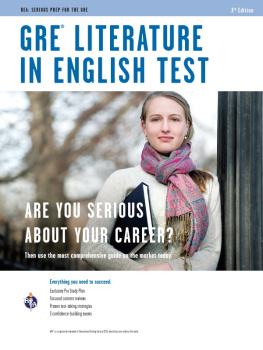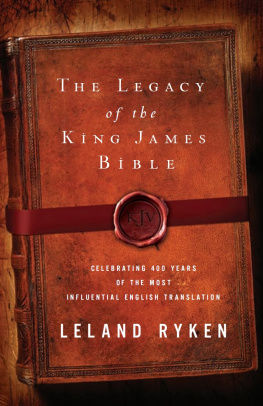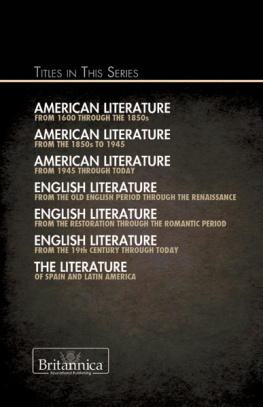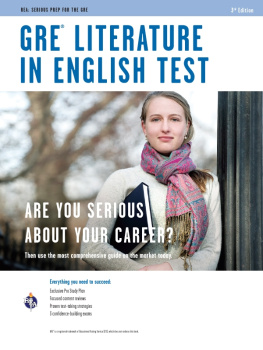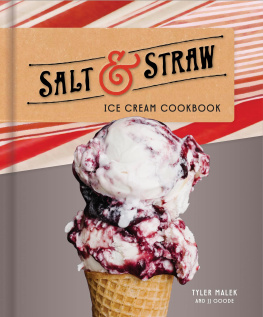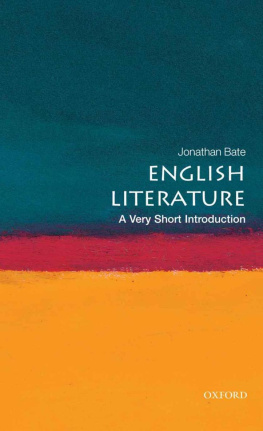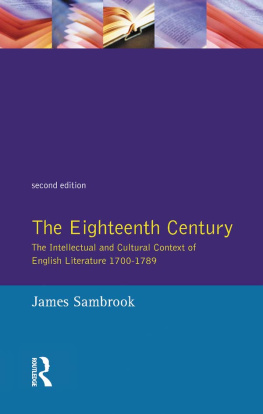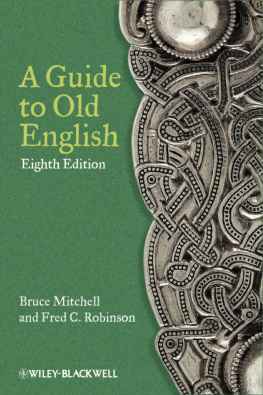Malek James S - GRE Literature in English (REA)
Here you can read online Malek James S - GRE Literature in English (REA) full text of the book (entire story) in english for free. Download pdf and epub, get meaning, cover and reviews about this ebook. year: 2013, publisher: Research & Education Association, genre: Home and family. Description of the work, (preface) as well as reviews are available. Best literature library LitArk.com created for fans of good reading and offers a wide selection of genres:
Romance novel
Science fiction
Adventure
Detective
Science
History
Home and family
Prose
Art
Politics
Computer
Non-fiction
Religion
Business
Children
Humor
Choose a favorite category and find really read worthwhile books. Enjoy immersion in the world of imagination, feel the emotions of the characters or learn something new for yourself, make an fascinating discovery.
- Book:GRE Literature in English (REA)
- Author:
- Publisher:Research & Education Association
- Genre:
- Year:2013
- Rating:5 / 5
- Favourites:Add to favourites
- Your mark:
- 100
- 1
- 2
- 3
- 4
- 5
GRE Literature in English (REA): summary, description and annotation
We offer to read an annotation, description, summary or preface (depends on what the author of the book "GRE Literature in English (REA)" wrote himself). If you haven't found the necessary information about the book — write in the comments, we will try to find it.
GRE Literature in English (REA) — read online for free the complete book (whole text) full work
Below is the text of the book, divided by pages. System saving the place of the last page read, allows you to conveniently read the book "GRE Literature in English (REA)" online for free, without having to search again every time where you left off. Put a bookmark, and you can go to the page where you finished reading at any time.
Font size:
Interval:
Bookmark:
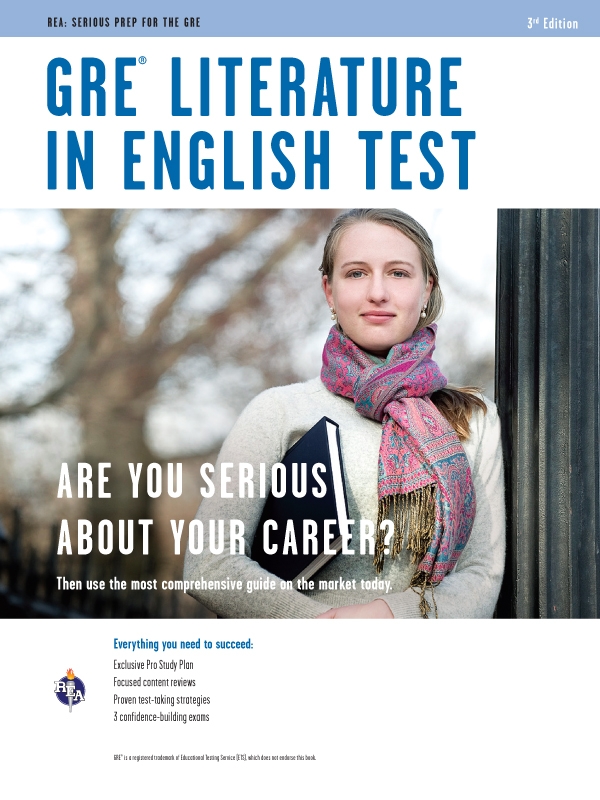
In addition to our authors, we extend special thanks to the following people: Anita Davis, Ed.D., and Dan Newman for technically editing the review and practice tests; David Gracer, Christopher Hubert, and Brian Walsh for their significant contributions in creating and assessing new practice test material; Dominique Won for copyediting the book in its final production stages; Ellen Gong for proofreading the manuscript; and Michael C. Cote for typesetting the book.
We would also like to thank the following people for their special efforts: Larry B. Kling, Vice President, Editorial, for his supervision of revisions; Michael Reynolds, Managing Editor, for coordinating revisions; Pam Weston, Vice President, Publishing, for ensuring press readiness; Kristin M. Rutkowski and Catherine Battos, for coordinating development; Nisha Aidasani, Lia Daniels, and Craig Pelz for their editorial contributions; Weymouth Design, for designing the cover of this book; and Network Typesetting, for typesetting revisions.
(a sample of the hundreds of letters REA receives each year )
What I found in your book was a wealth of information sufficient to shore up my basic skills in math and verbal... The section on analytical ability was excellent. The practice tests were challenging and the answer explanations most helpful. It certainly is the Best Test Prep for the GRE !
Student, Pullman, WA
I am writing to thank you for your test preparation... Your book helped me immeasurably, and I have nothing but praise for your GRE preparation.
Student, Benton Harbor, MI
My students report your chapters of review as the most valuable single resource they used for review and preparation.
Teacher, American Fork, UT
Your book was such a better value and was so much more complete than anything your competition has produced (and I have them all!).
Teacher, Virginia Beach, VA
Compared to the other books that my fellow students had, your book was the most useful in helping me get a great score.
Student, North Hollywood, CA
Your book was responsible for my success on the exam, which helped me get into the college of my choice... I will look for REA the next time I need helps.
Student, Chesterfield, MO
Classical literature has exerted a strong influence over English literary history. You will need a solid foundation in the major works of Greek and Roman letters for the GRE Literature in English Subject Test.
In addition to the brief outline of the works we present below, it will be useful for you to become acquainted with some of the conventions of the epic form. An important convention that can be traced to Classical literary practice is beginning the action in medias res Latin for in the midst of things. For instance, instead of being told chronologically, The Odyssey begins with Odysseus adventures with the nymph Calypso; the earlier action is told in flashback. Another convention of English authors, particularly those of the Early Modern Period, is to introduce the poem with the epic invocation, a request for aid from the Muses.
HOMER
ETS draws the majority of Classical literature questions from Homers The Iliad and The Odyssey . Reputed to be a blind man living in Greece circa the eighth century B.C., Homer is probably the most famous of the ancient poets. It is strongly recommended that you read or thoroughly familiarize yourself with both of these works.
The Iliad
Homers poem, The Iliad , deals with events from nearly 300 years before his own time. The basic story revolves around the titanic war between the city of Troy and several Greek city-states. When Paris, son of the Trojan King Priam, abducts the beautiful Helen, wife of Menelaus, the war begins. Menelaus brother Agamemnon, the Spartan king, leads the Greek forces against the Trojans, who are led by Priams son Hector. Throughout the poem, the gods on Olympus take sides in the conflict, elevating the chaos and destructiveness of the war.
The most powerful Greek warrior, the proud Achilles, sits on the sidelines refusing to fight because of a feud with Agamemnon. With the Trojans on the verge of victory, the Greek commanders implore Agamemnon to make peace with Achilles. This fails, but Achilles dear friend Patroclos does enter the battle wearing Achilles suit of armor. The Trojans are pushed back, but Hector kills Patroclos and provokes Achilles to a wild rage. He enters the fray in a suit of armor obtained through his mother, the demi-god Thetis, and kills Hector. In his rage he drags the Trojan heros body through the dirt with a chariot. Priams pleas move Achilles to return Hectors body.
The Odyssey
Homers second major work picks up from the end of the Trojan War and traces the adventures of the Greek commander Odysseus and his troubled journey home to Ithaca. The complicated plot is told largely in a series of flashbacks that deal with Odysseuss adventures, including his encounter with the Cyclops; his visit to the enchanted isle of Circe, a sorceress who turns his men into pigs; and his perilous journey through the dangerous straits of the sea monsters Charybdis and Scylla. A second major component of the poem concerns Odysseuss wife, Penelope, who waits for her husband and fends off the hordes of suitors who are pressing for her hand in marriage. His son, Telemachus, escapes the malicious designs of the suitors, and when his father finally reaches Ithaca, helps him slaughter them en masse . Odysseus resumes his place in Ithaca with his faithful wife.
GREEK TRAGEDY
Greek drama is not as popular with ETS as Homers epic poems, but you should be familiar with the major tragedians and some of their more important works. The three major Greek tragedians are Sophocles, Aeschylus, and Euripides. Sophocles is best known for his Oedipus cycle: Oedipus the King , Antigone , and Oedipus at Colonus. Oedipus the King and Antigone are the major plays of the trilogy, particularly the former, telling the story of the doomed Oedipus, who solves the riddle of the sphinx and becomes King of Thebes. He has already unknowingly killed his father, the former King of Thebes, and upon assuming the throne, unknowingly marries his mother according to the Oracles prophecy. When the truth is revealed, Oedipus, in horror, blinds himself, while his mother/wife Jocasta hangs herself in despair. Antigone tells the story of Oedipuss children. His daughter, the title character, defies the civil authority of Creon, Ruler of Thebes, who refuses to allow her brothers body to be properly buried.
Aeschylus is best known for his trilogy The Oresteia: Agamemnon, Choeporoe (or The Libation Bearers ), and Eumenides . These plays tell of the cursed house of Atreus. Agamemnon is murdered upon his return from the Trojan War by his wife Clytemnestra and her lover Aegisthus. Agamemnons son Orestes vows revenge and eventually kills his mother and her lover. The Furies, the horrifying divinities of revenge for intra-family murders, then pursue him. He is tormented to the point of madness until he is granted a trial, at which Athena votes in his favor, bringing an end to the family curse.
Euripides is not as important ultimately as Sophocles and Aeschylus; his major plays include Medea and Phaedra .
VIRGIL
The Roman poet Virgil (sometimes spelled Vergil), particularly his epic The Aeneid , is a cornerstone of Western literature. Virgil began his career with The Eclogues , a series of pastoral poems that were widely imitated in England and throughout Europe during the Renaissance. From The Eclogues , Virgil moved on to The Georgics , poems that dealt mainly with farming methods. The crowning achievement of Virgils career was The Aeneid ; the trajectory from pastoral poet to epic poet, known as the Virgilian career, was thought by many English authors to be the model for poets to follow.
Font size:
Interval:
Bookmark:
Similar books «GRE Literature in English (REA)»
Look at similar books to GRE Literature in English (REA). We have selected literature similar in name and meaning in the hope of providing readers with more options to find new, interesting, not yet read works.
Discussion, reviews of the book GRE Literature in English (REA) and just readers' own opinions. Leave your comments, write what you think about the work, its meaning or the main characters. Specify what exactly you liked and what you didn't like, and why you think so.

